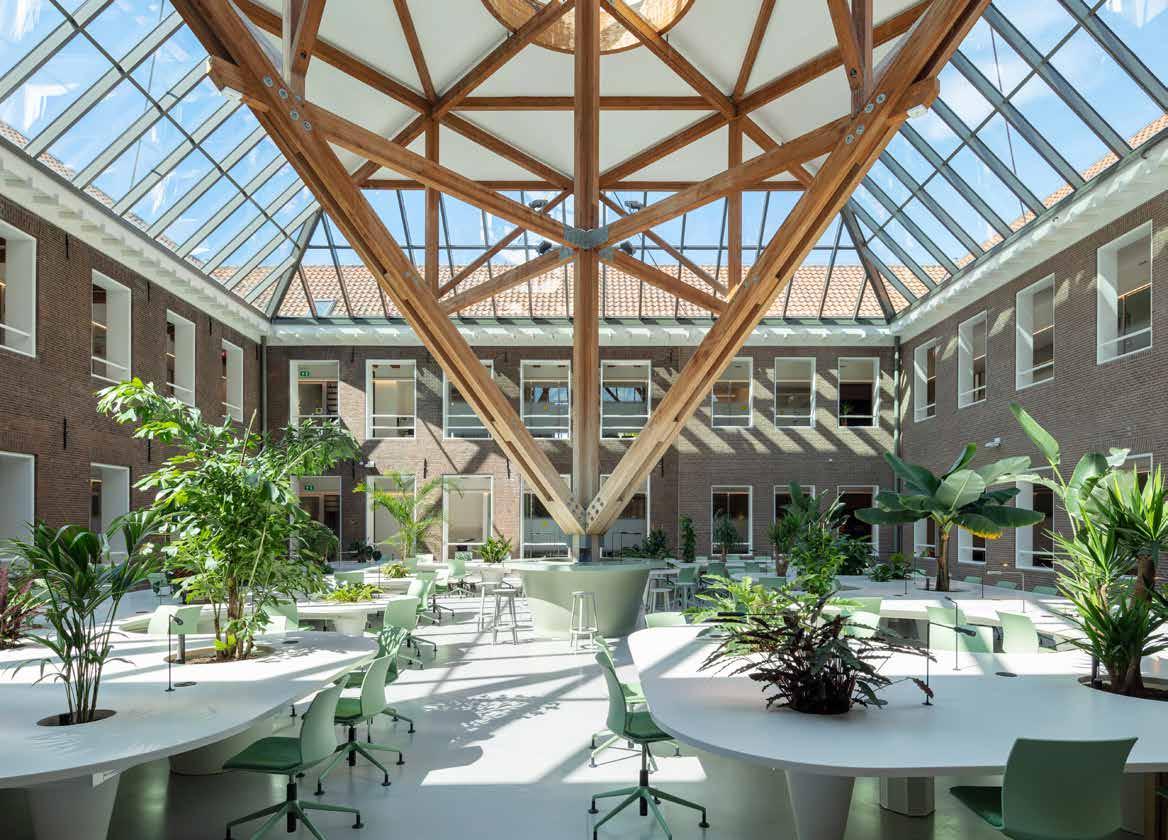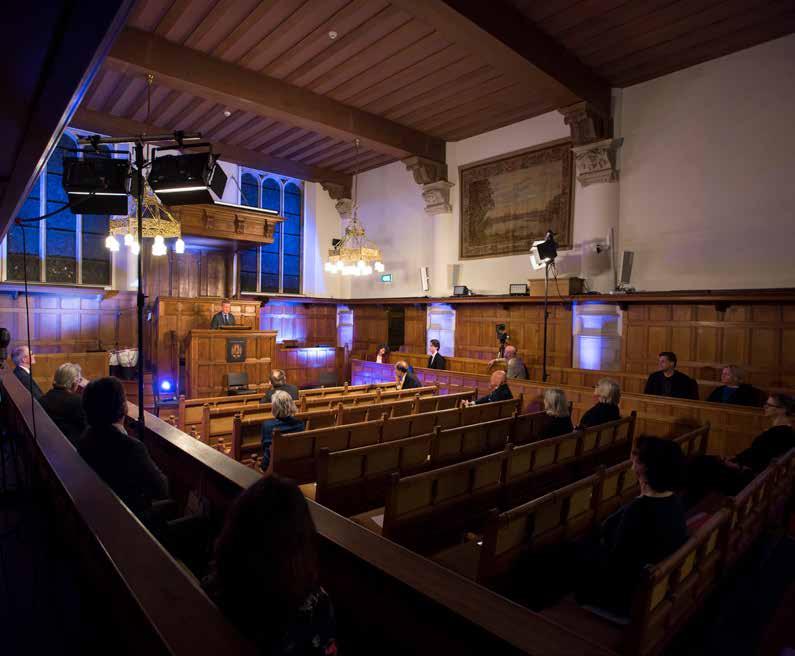
6 minute read
Humanities
from About us 2021
The humanities offer windows on the world
In these times of globalisation, the humanities are more important than ever. Migration, integration, trade and technology are causing the borders between countries and cultures to fade. If we want to work and live together in harmony, we have to understand one another. The humanities provide the insights that we need for this.
The Faculty’s research and teaching ranges from languages, cultures and regional studies to history, philosophy, the arts and religious studies. Our researchers are driven by passion and curiosity for the world around them.
RESEARCH
Our research covers almost all continents and periods, and our researchers are committed to developing, disseminating and applying academic knowledge. We strive to be an authority in the academic
and public debate. Our research is interdisciplinary in its approach, with experts sharing their knowledge and understanding. This helps improve our teaching and research projects.
Research centres
• Centre for Indigenous Americas • Leiden Asia Centre • Leiden University Centre for Digital
Humanities • Leiden University Centre for the
Study of Islam and Society • Research School for Philosophy • Research School for Medieval
Studies • The Netherlands Institute for the
Near East (NINO) • Netherlands Institute in Turkey (NIT)
Graduate School
The Graduate School of Humanities is responsible for all PhD programmes at the Faculty of Humanities.
TEACHING
Our main priority is ensuring our students succeed. Curiosity-driven learning is at the heart of our teaching. Our programmes are as smallscale as possible, and we provide opportunities for tailored learning such as personal learning pathways and an honours programme for ambitious students. We also have a talent programme for secondaryschool students.
Our Faculty trains students to be critical thinkers, academic professionals and engaged citizens with international and intercultural skills who will help resolve the future challenges. We therefore consider career preparation to be essential.
FACTS AND FIGURES 2020
7,595 students: 5,411 bachelor’s students and 2,184 master’s students
1,025 staff (658 academic and 367 non-academic)
Institutes:
• Academy of Creative and Performing Arts • Centre for the Study of Religion • Institute for History • Institute for Philosophy • Leiden University Institute for Area Studies • Leiden University Centre for the Arts in Society • Leiden University Centre for Linguistics • Netherlands Institute Morocco
76 doctorates
The research and teaching at the Faculty of Humanities ranks among the top 30 in the world (THE Ranking).
BACHELOR’S PROGRAMMES
• BA in African Languages and Cultures • BA in Ancient Near Eastern Studies • BA in Art History • BA in Arts, Media and Society • BA in Chinese Studies • BA in Classics • BA in Dutch Language and Culture • BA in Dutch Studies • BA in English Language and Culture • BA in Film and Literary Studies • BA in French Language and Culture • BA in German Language and Culture • BA in History • BA in International Studies • BA in Italian Language and Culture • BA in Japanese Studies • BA in Korean Studies • BA in Latin American Studies • BA in Linguistics • BA in Middle Eastern Studies • BA in Philosophy • BA in Philosophy: Global and
Comparative Perspectives • BA in Religious Studies • BA in Russian Studies • BA in South and South East Asian
Studies • BA in Urban Studies
MASTER’S PROGRAMMES
• MA in African Studies • MA in African Studies (research) • MA in Arts and Culture • MA in Arts and Culture (research) • MA in Asian Studies (60 EC) • MA in Asian Studies (120 EC) • MA in Asian Studies (research) • MA in Classics and Ancient Civilisations • MA in Classics and Ancient Civilisations (research) • MA in Dutch Studies • MA in European Politics and Society • MA in History • MA in History (research) • MA in International Relations • MA in Latin American Studies • MA in Latin American Studies (research) • MA in Linguistics • MA in Linguistics (research) • MA in Literary Studies • MA in Literary Studies (research) • MA in Media Studies • MA in Middle Eastern Studies • MA in Middle Eastern Studies (research) • MA in North American Studies • MA in Philosophy (60 EC) • MA in Philosophy (120 EC) • MA in Religious Studies • MA in Russian and Eurasian Studies
Job market survey
Our humanities graduates are doing well: 70 percent of our bachelor’s and master’s students find their first job within two months of graduation. And for 83 percent of our master’s students that first job is at a higher professional or academic level. These are the results of the Faculty of Humanities job market survey that is held every four years. Many people think that humanities graduates end up in education, but the survey shows that the majority find work in other sectors, such as government, business and consultancy. For the results of the research see baannajestudie.nl.
Museums, collections and society
Museums are increasingly the subject of societal debate. This could entail discussions about looted art, Nazi art or the use of the term ‘Golden Age’. Pieter ter Keurs, Professor of Museums, Collections and Society, sees this as a positive development: ‘For a long time, museums maintained that they were objective and politically neutral, but these days they can no longer do that. Museums need to show the societal context of exhibits and explain their background on the basis of scientific research.’ Leiden is the ideal place for collection-focused research and education in museology. Ter Keurs wants to use his new professorship to bring together knowledge, research and education in the field of collections, heritage and museums in Leiden and the surrounding area.



Humans of Humanities: the movie
The Faculty of Humanities covers a wide range of academic fields. What is the common ground of all the different academics and students there? Why does their work matter in today’s world? In the short documentary Humans of Humanities, academics, students and alumni from the Faculty of Humanities talk about how important the humanities are. Professor Rob Zwijnenberg tells us about why we shouldn’t lose sight of the ethical objections to genetic manipulation and alumna Joke Bruynzeel talks about the value of cultural knowledge to international business. The premiere of the film was on 9 March 2020 in Trianon cinema in Leiden. Watch the film at: www.universiteitleiden.nl/humanitiesmovie

Unique Huizinga lecture
The Huizinga lecture has been given every year since 1972. Author and columnist Maxim Februari had the honour of giving the 49th Huizinga lecture in 2020. In this exceptional year when the coronavirus held sway, the lecture did not take place in its normal venue, Pieterskerk, but in the Great Auditorium of the Academy Building, and there was no audience. Instead, hundreds of people watched Februari’s lecture on ‘Bad art’ on 11 December 2020 via a livestream. His lecture centred on how artists and writers are expected to help shape the postcorona world and contribute to our recovery. But, Februari asked: ‘Does art not have better things to do?’










